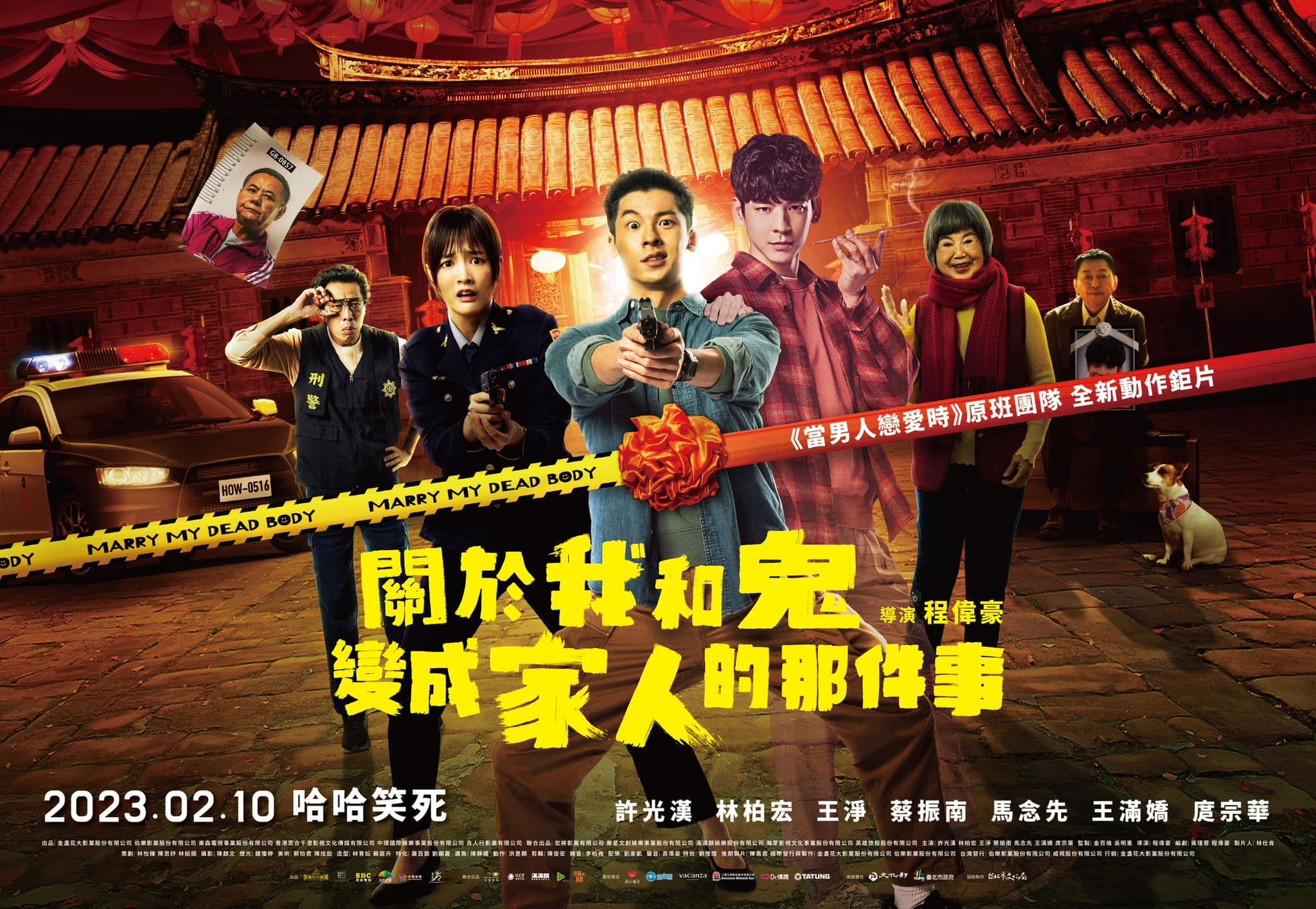by Brian Hioe
語言:
English
Photo Credit: Marry My Dead Body/Facebook
MARRY MY DEAD BODY (關於我和鬼變成家人的那件事) is an entertaining and capably executed, if a bit breezy, buddy cop comedy with LGBTQ themes. The outlandish premise–featuring a straight, initially homophobic police officer whose attitudes gradually change through interactions with a gay ghost that he becomes haunted by–certainly proves memorable.
The film follows police officer Ming-han, who picks up a red envelope while on a case. As per traditional Taiwanese religious customs, this means that he is required to marry a dead person or face being cursed–in this case, a dead gay man, Mao Mao. Though initially unwilling, after experiencing a string of bad luck caused by his rejecting the marriage, he goes through with it–finding himself haunted by Mao Mao as a result.

Photo credit: Marry My Dead Body/Facebook
Beyond the grave, Mao Mao, too, accidentally ended up marrying Ming-han through a slip of the hand during moon block divination–a traditional temple rite to communicate with the supernatural–and so the two initially have the dynamic of unwittingly being forced upon each other. To rid himself of his new ghostly companion, Ming-han takes it upon himself to resolve Mao Mao’s regrets in life, including taking care of his dog, meeting his parents and boyfriend, and trying to find Mao Mao’s killer. As it turns out, Mao Mao’s death from a hit-and-run incident is linked with the case that Ming-han was working on at the time he accidentally picked up the red envelope, seeing as the criminal mastermind of this case was involved in the hit-and-run.
Greg Hsu and Austin Lin both give strong performances as Ming-han and Mao Mao respectively, with Lin often providing comedic antics that Hsu reacts to–as the literal straight man. Lin’s moments of deadpan as Mao Mao are particularly effective. The dynamic between the two characters effectively carries the film, as the two become friends, and come to see each other as family.
Many elements of the film are quite excellent. In particular, the film’s many set pieces and action sequences are tightly shot, including over-the-top car chases, fight scenes between Ming-han and local gangsters, ghostly hijinks from Mao Mao, or a later scene set in a gay club. The film’s consistent sense of pacing is admirable–though this falls apart near the end of the film, which goes on a bit long, and has too many plot threads that it somewhat clumsily tries to resolve.
Likewise, the film manages to convey a strong sense of local Taiwanese flavor through scenes involving traditional temple rites. Although it is not ever brought up directly in the film, the movie is quite clearly set in Taipei’s Wanhua District–not only the site of many classic Taiwanese gangster dramas ranging from Dust of Angels to Mongka, but the LGBTQ-oriented district of Ximen. And so this is a rather appropriate setting considering the subject matter. Many of the places shot in the film are real locations in Wanhua.
If there is a shortcoming to the film, it may be that it tries to mainstreamize its content, and does not engage seriously enough with some topics. The first scene in the film depicts Ming-han targeting a gay man in a gym over drug charges, for example. Though the film uses this scene to hone in on Ming-han’s homophobia–particularly in light of the history of police violence against gay people in Taiwan or elsewhere, at gyms, saunas, and other locations–the film may still take too light a tone to serious topic matter. Scenes involving Ming-han or Mao Mao’s father attacking Mao Mao’s past partner over infidelity similarly raise issues.
It should also be said that the film is not free of the problematic “bury your gays” trope–even if it is a very creative spin, of course, to have Mao Mao start off the film already dead and be a ghost for the entirety of the movie.

Photo credit: Marry My Dead Body/Facebook
At the same time, it is clear that the film aims to have a social message for its broader audience–which is to call for acceptance. The movie suggests this early on, directly referencing how its premise reverses Taiwan’s social circumstances in past years, in focusing on Ming-han as an initially homophobic young person, while Mao Mao’s elderly grandmother and her friends are decidedly more accepting. After all, in Taiwan, pushback against the legalization of gay marriage–making Taiwan the first place in Asia to do so–has primarily come from older conservatives, rather than young people. Mao Mao is depicted as having been a progressive activist in life–in particular an environmentalist–which perhaps contrasts to how Ming-han is more conservative as a police officer. Ming-han–who strangely seems to have no relatives in another plot point that is never addressed–is shown as eventually finding a foster home in Mao Mao’s family
Either way, the movie is not serious fare. The emotional dynamic of Marry My Dead Body ultimately proves a bit mawkish, and this proves one of the film’s largest shortcomings. Yet the film works well enough and it is perhaps a film representative of social views among young people in Taiwan today.



